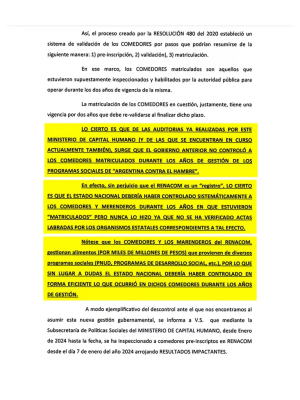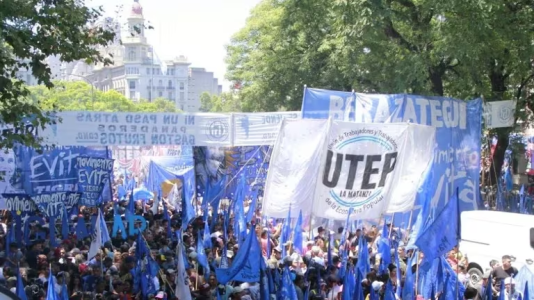All the Answers
Well-known member
The Government denounced that half of the canteens and picnic areas that received assistance from the State do not exist - Infobae

Source:

El Gobierno denunció que la mitad de los comedores y merenderos que recibían asistencia del Estado no existe
Sólo se pudo confirmar el 52,3% de los establecimientos asistenciales. El restante 47.7% no funciona más como tal y el 25% de las direcciones no existe o allí nunca hubo un merendero; por ejemplo, había uno que aparecía situado en un country
May 13, 2024
Only 52.3% of healthcare establishments could be confirmed. The remaining 47.7% no longer function as such and 25% of the addresses do not exist or there was never a picnic area there; For example, there was one that appeared located in a country
By Andres Klipphan

The Ministry of Human Capital, headed by Sandra Pettovello , filed a new criminal complaint when verifying that “ almost 50% of the canteens attended by the previous Government were non-existent and one 'worked' in a country . ”
The complaint - as Infobae learned - is for "failure to comply with the duties of a public official" and " fraud against the Public Administration." The legislation requires that the officials who authorized the release of food for the most vulnerable sectors of society had to control where the food went, who was responsible for the establishments, and how many people attended. None of that happened.
The writing correlates with what this medium already reported, that tons of dry food left the warehouses of the former Ministry of Development, the pallets were loaded on trucks chartered by the organization and from there they ended up in warehouses of the social organizations grouped in the Popular Economy Workers Union (UTEP), the majority aligned with the then government of Alberto Fernández, and to a lesser extent with piqueteros movements.
However, this is the first time that the Legal Undersecretary of Human Capital, headed by Leila Daniela Gianni , gives names of “non-existent” dining rooms. Some of the examples cited in the complaint are: “ Conquering Smiles”; “Little Giants of Quilmes”; "Open skies"; “Moonlight of Pereyra”; "Hope"; “The Little Ones of San Alberto”; “Light and Hope ”. These places, the writing states, “do not function as such.” What's more, it is stated, "the homes declared as supposed dining rooms did not exist." Another example of the absence of control of the former social portfolio that was in charge of the current national deputies of Unión por la Patria, Daniel Arroyo and Victoria Tolosa Paz and the former mayor of Hurlingham, Juan Horacio Zabaleta .

The emblematic case of the complaint is that of the supposed “ Gauchito Gil ” dining room: when trying to verify its existence, it was determined that “in its place there is actually a private neighborhood . ”
In “Sol de Barrio” it was not possible to locate the address, and the neighbors claim that no dining room ever operated there . In other cases, there are not even names of the places in the registry, but rather they are only identified with a file number , but even when the visual inspection was carried out it was confirmed that they did not exist either .
From the audits it emerged that: “Of all the dining rooms “ only half (52.3%) could be surveyed.” The remaining 47.7% could not be surveyed because: 32% no longer function as such ; 25% of the pre-registration data do not coincide with the real data (non-existent addresses, addresses in which there are no dining rooms/snack areas) and almost 16%, a dining room/snack area never operated at the declared address . ”
For these reasons, the complaint states that "the lack of control over the billions of pesos that the National State invests in ensuring that the most vulnerable population can eat cannot be 'raffled off' without control under penalty of allowing one of "the worst of sins: that food does not reach those who need it most and that the National State becomes a supplier of food to spurious and unscrupulous third parties ."

Alberto Fernández and Daniel Arroyo presented the Argentina against hunger program also known as Table against hunger
Among the classifications of the possible crime, the document cites those of “failure to fulfill the duties of a public official and fraud against the Public Administration.”
The document consists of 14 pages. In the fourth, it is maintained: "The truth is that from the audits already carried out by this Ministry of Human Capital (and from those that are currently underway as well) it appears that the previous Government did not control the registered canteens during the years of management of social programs ' Argentina against hunger '”.
This program had been announced with great fanfare by the Fernández administration during the COVID-19 pandemic, when it was assured: “The Argentina Plan against Hunger is supported by the strengthening of the actions carried out by the National Food Security Program and Nutritional . It involves the promotion and strengthening of Access to the Basic Food Basket.”
The advertising spots stated that “11.2 million people receive food assistance throughout the country,” and detailed that from January 2020 to July of that year, $69,745 million had been invested in food, possibly delivered to many soup kitchens. existed, but others did not. Now it will be Justice that will have to investigate where those foods went and if they actually came from the former Ministry of Social Development.
Pettovello's complaint also clarified that: “Without prejudice to the fact that the RENACOM (National Registry of Community Kitchens) is a 'registry', the truth is that the National State should have systematically controlled the canteens and picnic areas during the years in which They were 'registered' but they never did so, since no records drawn up by the corresponding state agencies for that purpose were verified.”
The person in charge of RENACOM, created in July 2020, was Laura Alonso . The leader of La Cámpora was the Secretariat of Social Inclusion.

Daniel Arroyo, Juan Zabaleta and Tolosa Paz, the three ministers of the former Social Development portfolio of the Government of Alberto Fernández
“The Registry will allow us to have precise information about each of the canteens and picnic areas that different civil society organizations run throughout the country. In this way, we will be able to improve the public policies that we are implementing to guarantee food security,” Laura Alonso explained at the time in a press conference with Minister Daniel Arroyo.
On the subject, the Human Capital complaint highlights: “Note that the RENACOM canteens and picnic areas manage food (for billions of pesos) that comes from various social programs (PNDU, social development programs, etc.), so Without a doubt, the National State should have efficiently controlled what did not happen in said programs during the years of management.

The Government denounced that almost half of the soup kitchens attended by the previous government, in the hands of social organizations "do not exist" UTEP MARCHA CGT JANUARY 24
From Pettovello's portfolio it was explained to this medium that the judicial presentation was made, "within the framework of the active anti-corruption and transparency policy undertaken by the national government." And that "since December 10, 2023, the Human Capital portfolio has carried out various audits within the Secretariats and organizations that depend on the portfolio."
The judicial text also details that: “On January 8, 2020, the Argentine National Plan against Hunger was created, which aimed to guarantee food security to vulnerable sectors and should, in theory, guarantee access to food and benefits. for picnic areas and community dining rooms. All this, with the control of the Secretariat of social inclusion that depended on the then Ministry of Social Development of the Nation.
The process established a validation system for the dining halls in steps that could be summarized as follows: “1) pre-registration, 2) validation), 3) registration.”
That registration, detailed in the complaint, “was granted for two years and required revalidation from that date, otherwise, they should not continue to be part of the beneficiaries.”
However, from the audits ordered by Pettovello on the National Registry of Community Canteens and Picnic Areas of Civil Society Organizations, it emerges that “the previous management of the national government did not carry out the corresponding controls on the canteens that it attended with merchandise.”
“The absence of control over state money is reflected in the material impossibility of being able to properly control and/or inspect the benefits that were granted, and/or whether the recipient soup kitchens were correctly selected for this purpose; or, if they had some type of incompatibility that made said granting illegal,” says the judicial presentation accessed by this media.

